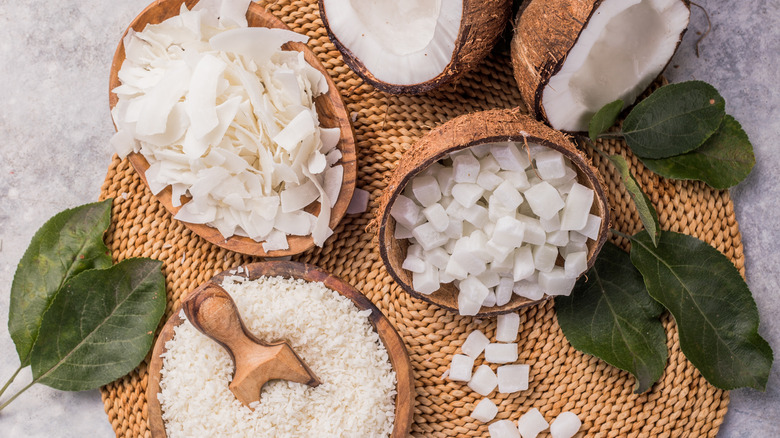How To Properly Store Coconut Flakes In Your Pantry
Whether you sprinkle them over ice cream, mix them into trail mix, or bake them into desserts, coconut flakes are a delicious way to add texture and a dash of tropical flavor to some of your favorite dishes. It's certainly an ingredient most home cooks should keep in their kitchen (hey, you never know when you'll need them!). But if you want to make sure you get the best-tasting coconut custard pie or coconut-topped cupcakes every time you use the flakes, the secret is in how you store them.
Though they're typically dehydrated before packaging, the peeled bits of coconut pulp can still be quite delicate and susceptible to shifting environmental factors in your home. To keep them tasting fresher for longer, and to preserve that wonderful bit of flaky crunch they provide, it's best you keep the ingredient stored in an airtight container at room temperature, far from any excess heat, humidity, or light. You also want to make sure no moisture gets into your package of coconut flakes, as that can accelerate spoilage and cause them to get soft and clumpy, losing that crispness you love. A great place to keep your flakes, therefore, is in a dark pantry or cupboard, away from the heat and steam of your stovetop.
How to tell that your coconut flakes have gone bad
Some store-bought varieties of coconut flakes may have added sweeteners or preservatives that can affect how long they last, but generally, they should stay fresh in your pantry for up to six months — provided that they're kept in a properly sealed container, of course. If you have a large batch that you wish to preserve for longer, you can keep your flakes in the refrigerator or freezer, where they should maintain their flavor for up to 10 and 12 months, respectively. Just note that they will likely soften up when refrigerated or frozen.
Even if you do everything right when storing coconut flakes in your pantry (or fridge), you'll still want to watch out for signs of spoilage before you cook or consume them. To prevent ruining your entire dessert or batch of trail mix by sprinkling in bad coconut, look for any discoloration in your flakes, and be sure to sniff for any unpleasant smells. If your flakes feel slimy or soggy, that's also a surefire sign to throw them into the trash. Additionally, coconut flakes may become a bit softer and chewier as they lose their freshness. While that does indicate that they're going a bit stale, they should still be safe to eat so long as they don't smell or look off. The bottom line? Take care of your coconut flakes, store-bought or otherwise, and they'll take care of your taste buds for months to come.

